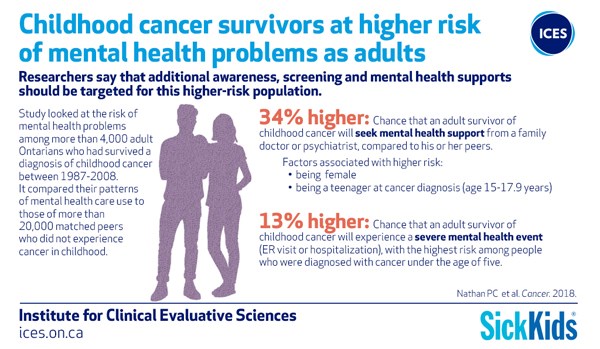Childhood cancer survivors at higher risk of mental health events
Summary:
Childhood cancer survivors are at a significantly higher risk of a severe mental health event requiring an emergency department (ED) visit or hospitalization, according to a new study by researchers at the Institute for Clinical Evaluative Sciences (ICES) and SickKids.
TORONTO — Childhood cancer survivors are at a significantly higher risk of a severe mental health event requiring an emergency department (ED) visit or hospitalization, according to a new study by researchers at the Institute for Clinical Evaluative Sciences (ICES) and The Hospital for Sick Children (SickKids).
In the study published today in Cancer, researchers examined data representing 4,117 childhood cancer survivors and 20,269 controls, and observed that rates of mental healthcare visits to family physicians and psychiatrists as well as the risk for a severe mental health event were significantly increased in survivors.
“While previous research has shown that childhood cancer survivors have an elevated risk of physical health issues later in life, our study shows that these same survivors are also at risk for mental health challenges,” says Dr. Sumit Gupta, co-author of the study, adjunct scientist at ICES and staff oncologist and clinician investigator at SickKids. “In particular, survivors of adolescent cancer have a higher rate of mental health visits and survivors of cancer diagnosed prior to age five have a markedly elevated risk of severe mental health events.”
The researchers found that childhood cancer survivors who were diagnosed before the age of five are at the highest risk for a severe mental health event: by age 28, 16 per cent of these adults will have had an ED visit or hospitalization for mental health reasons.
The researchers found childhood cancer survivors had a 34 per cent higher rate of medical visits for a mental health complaint compared to the general population and most visits were to family physicians and psychiatrists. ED visits and hospitalizations were less common but survivors still had a 13 per cent increase in their risk for a severe mental health event. Risk was driven by sociodemographic factors such as female gender and lower income, not cancer type or treatment.
“Our study shows that female survivors of adolescent cancers are at the highest risk of seeing a family doctor or psychiatrist for a mental health issue,” says Dr. Paul Nathan, co-author on the study, staff oncologist, clinician investigator and the Director of the Aftercare program in the Division of Haematology/Oncology at SickKids. “Our results show that aftercare programs should be screening childhood cancer survivors for mental health issues just as we screen for physical complications of treatment.”
“Adverse mental health outcomes in a population-based cohort of survivors of childhood cancer,” was published today in Cancer.


